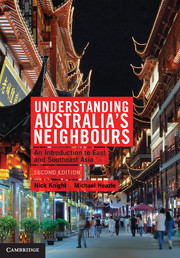Book contents
- Frontmatter
- Contents
- List of Maps
- Acronyms and abbreviations
- Acknowledgments
- Maps
- Introduction
- 1 The idea of ‘Asia’
- 2 Tradition and modernity in East and Southeast Asia
- 3 Tradition and modernity in East and Southeast Asia
- 4 Colonialism in East and Southeast Asia
- 5 Nationalism and revolution in East and Southeast Asia
- 6 Nations and nation-building in East and Southeast Asia
- 7 International politics and East and Southeast Asia
- 8 Economic growth in East and Southeast Asia
- 9 Democracy, human rights and development
- 10 Globalisation and East and Southeast Asia
- 11 China–Japan relations and US power in the twenty-first century
- 12 Australia in Asia, ‘Asia’ in Australia
- Bibliography
- Index
- References
9 - Democracy, human rights and development
Published online by Cambridge University Press: 05 June 2012
- Frontmatter
- Contents
- List of Maps
- Acronyms and abbreviations
- Acknowledgments
- Maps
- Introduction
- 1 The idea of ‘Asia’
- 2 Tradition and modernity in East and Southeast Asia
- 3 Tradition and modernity in East and Southeast Asia
- 4 Colonialism in East and Southeast Asia
- 5 Nationalism and revolution in East and Southeast Asia
- 6 Nations and nation-building in East and Southeast Asia
- 7 International politics and East and Southeast Asia
- 8 Economic growth in East and Southeast Asia
- 9 Democracy, human rights and development
- 10 Globalisation and East and Southeast Asia
- 11 China–Japan relations and US power in the twenty-first century
- 12 Australia in Asia, ‘Asia’ in Australia
- Bibliography
- Index
- References
Summary
THE RELATED ISSUES OF DEMOCRACY, human rights, and development attract considerable attention in Western media reports and scholarly literature on East and Southeast Asia. The tone of this discourse is often critical of the perceived inadequacies of the political systems of some Asian nations, which are considered authoritarian and not sufficiently committed to respecting the right of their citizens ‘to life, liberty and security of person’ (Article 3 of the Universal Declaration of Human Rights). Moreover, past economic failures, as occurred during the 1997 financial crisis, were often explained in terms of corruption, cronyism, and weak domestic institutions (law, property rights, market-led economy) in these countries. In short, they have been criticised for not being sufficiently like Western political systems, which are presented as models for what constitutes a stable, legitimate, and prosperous democratic society.
But in what became known as the ‘Asian values debate’ during the late 1990s and early 2000s, the leaders of some East and Southeast Asian nations, such as Muhammad Mahathir of Malaysia and Lee Kuan Yew of Singapore, rejected this criticism on the grounds that Asian societies have cultural values different from those of the West. These ‘Asian values’ – harmony, unity, respect for leadership, loyalty, consensual decision-making – make slavishly copying the political systems and values of Western nations both impractical and undesirable (Kausikan 1998). Even if democracy and human rights are, as the West maintains, universal values, Asian nations are just not able to implement them, at least not yet. According to this view, their economic underdevelopment relative to Western industrialised nations necessitates political systems that can ensure the stability and harmony necessary for continuing development, something that democracy and a concentration on the rights of the individual cannot do. What is needed is strong leadership rather than the uncertainty and disunity created by the competitive politics and individual liberties of Western democracy. Western criticism also has been rejected as politically motivated interference in the internal affairs of the sovereign nation-states of East and Southeast Asia, an argument often made by Chinese officials. It is denounced as a form of cultural imperialism, and a foreign policy tactic used by Western nations, in particular the US, to bully Asian nations. The West should mind its own business, Asian leaders retort, especially when its own record of democracy and respect for human rights is not only very uneven but also historically quite recent.
- Type
- Chapter
- Information
- Understanding Australia's NeighboursAn Introduction to East and Southeast Asia, pp. 161 - 178Publisher: Cambridge University PressPrint publication year: 2011

